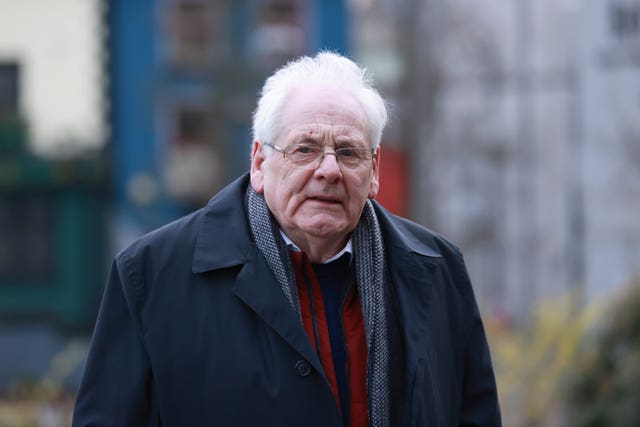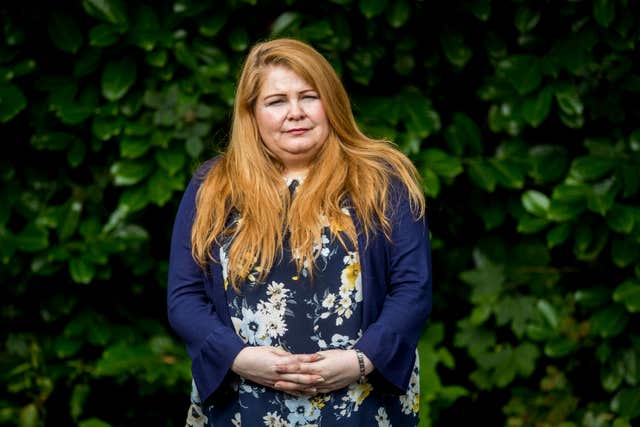Michael Gallagher speaks about toll of campaigning in aftermath of Omagh bomb
His son Aiden, a 21-year-old mechanic, was one of 29 people who was killed in 1998.

The father of one of those killed in the Omagh bomb attack has spoken of the toll that years of campaigning had on his life and family, saying he wanted to put faces to the victims.
Michael Gallagher’s son Aiden was killed in the 1998 dissident republican car bomb which exploded in the centre of the Co Tyrone town on a busy Saturday afternoon.
Aiden, a 21-year-old mechanic, was one of 29 people who lost their lives on the day.
His father Michael became a “figurehead” for many of those affected by the Omagh bombing after he chaired a group set up to help grieving families.

In the second week of commemorative hearings for the victims, Omagh Bombing Inquiry chairman Lord Turnbull told Mr Gallagher that he is known to governments around the world, as well as senior politicians, and was recently praised by deputy Irish premier Simon Harris due to his campaigning work.
Mr Gallagher told the inquiry that the work involved a lot of travel and time away from his family.
He also described how it was “heartbreaking” to watch everyone in his family grieve and that following Aiden’s death there was “no joy, no laughter” in their family home.
He said that Aiden’s chair remained empty, and “part of us empty too”.
Speaking about his campaigning work in the years after the bomb, he said it took over his life.
“If I have a regret, I would have to say that I would have liked to, and probably should have, spent more time with my own family and less campaigning,” he told the inquiry.
“But, it seems to be the way that things worked out.
“We don’t have the benefit of hindsight but I do think that I would personally have benefited, and my family certainly would have benefited, if I had done less campaigning.
“That’s a hugely difficult but honest thing that I have to say. If there’s a consolation in all of that, it’s the fact that we are here today, and I’ve sat through all of the testimonies that I’ve heard, and it has moved me enormously.
“I feel to put a human face to the person rather than a statistic, I think that’s been one of the consolations, even if we achieve no more than that. But I do hope that we will continue to answer some of the very difficult questions that we haven’t had answers to so far.”
The inquiry heard that Aiden shared his birthday with his grandfather, John O’Connor, and that there was exactly 60 years between them.
The pair had developed a “special bond” and always celebrated their birthdays together.
“It was something that was very special for both of them,” Mr Gallagher said.
“It was something that we always valued and we know his granddad valued it.”
Mr Gallagher said that John was a different person after the bomb and that he died 11 days after Aiden’s death. The family believe his death is directly linked to Aiden’s killing.
Mr Gallagher said the family were a close unit as they spent so much time together through the family business including running a cafe and limousine and taxi business.
He said that Aiden had a strong work ethic.
“He was always somebody that knew the importance of doing things and doing them right and as he got older, he enjoyed doing what he’d done, but he also felt that it had to be done right,” he added.
He said that Aiden developed a love for vehicles and engines from an early age.
“He was a normal young person. He would have went out at the weekend with his friends. They enjoyed having a beer and having fun,” he added.
“Cars were absolutely the main interest in his life but it wasn’t the only interest.
Aiden had a wide group of friends who came from different backgrounds, which was particularly evident during his wake and funeral.
“We live in a country that there’s a lot of division, bigotry on both sides, but we never allowed that to penetrate our family,” he added.
“We chose our friends because of the content of their heart, not because of their religion or their politics, and that was an example that we gave to our children.”
He said that Aiden was the joker of his friendship group.

“There’s no question about it. He enjoyed fun. He enjoyed company, enjoyed being with people.
“He was fun to be with. He was sensitive to others.”
Aiden also shared a special bond with his mother, Patsy.
The inquiry was told that she dealt with Aiden’s killing “inwardly”.
“I don’t know where she got the energy. Given that her father died 11 days after that, I think it shows the strong character that she is, that she could manage that. I personally found it very difficult to deal with but she seemed to cope,” Mr Gallagher added.
“I don’t know whether, and I’m sure that inwardly, she was struggling, but she did manage to hold it together, and that was unbelievable, knowing the bond that was there between both of them.”
Mr Gallagher, whose brother was shot dead by republican paramilitaries, said that following the signing of the Good Friday Agreement, he thought a new chapter was beginning in Irish history “where people could live together and play together and enjoy and appreciate each other’s company”.
Speaking about the day of the bomb, he said that he last saw his son at their family home hours before the blast.
He said that Aiden left to go into town to meet a friend to buy a pair of jeans.
Describing his last moments with his son, Mr Gallagher added: “We had what I would describe as a pleasant conversation. In fact, I remember telling him where to park the car that would be convenient to the shop he was going to.
“He turned around and he walked down the hall, and I remember he looked back for the last time and he said, ‘I won’t be long’. And that was really the last time we seen Aiden.”
Hours later, he was at a makeshift mortuary identifying his son’s body.
He said that telling his family that Aiden would not be coming home was “extremely painful and difficult” but that the response from the public to Aiden’s death helped restore their faith in human nature.
He said he feels that Aiden has never left them and that he has always been part of their family.
Aiden’s sister Cat Wilkinson said she was “living in turmoil” following his death.
“I was like a caged animal, frustrated, confused and angry,” she said in her statement to the inquiry.
“My parents could cry together, reminiscing about old times, I could not. I wish I could, but I still did not believe that he was dead.
“I could not allow myself to believe he was dead. I even convinced myself that he never existed, and at times I couldn’t even remember what he looked like, as though I was watching a movie.
“I was disconnected to what was happening around me, I felt like this for a very long time.
“I have often asked if it’s better to be the victim or the survivor, something that can never be fully answered and changes depending on mood.”





